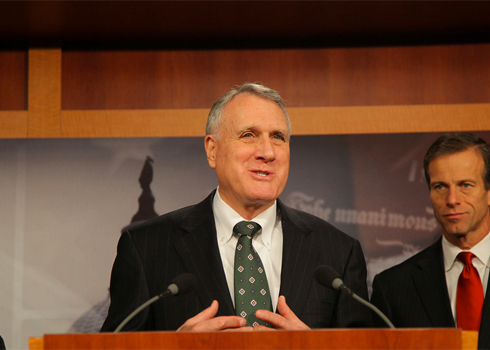Let’s assume Democrats and Republicans team up in the next few weeks to pass a very GOP friendly debt reduction bill. And let’s stipulate, too, that, as in Britain and elsewhere, the spending-cut magic doesn’t do anything to help the unemployment crisis, leaving President Obama and the Democrats a huge political liability — and national problem — they won’t be able to resolve by election time in November.
[TPM SLIDESHOW: Battle Over The Budget: Behind The Scenes At The White House]
This is why they’re trying to squeeze something — anything — into the debt ceiling package that will provide near-term stimulus, to improve the jobs situation or at least counteract the austerity measures. Unfortunately, Republicans have foreclosed on the highest-impact ideas economists have recommended — aid to states, infrastructure investment, and other direct spending projects.
So they’ve settled on a fourth- or fifth-best option: a plan to provide employees deeper, temporary relief from the payroll tax, and extend that relief to employers as well. It’s not the most stimulative thing in the world — but it is a tax cut for business owners, so at the very least it should have some buy-in on the right, no?
You might think so, but you’d be wrong.
“I don’t think it’ll do much,” Douglas Holtz-Eakin — perhaps the most influential economist in GOP circles — told me last week. “The economics of it don’t matter whether it’s the employer or the employee side so that’s not a big deal. Temporary counter-cyclical stimulus has proven to be pretty ineffectual, and what are really needed are permanent pro-growth policies and chief among those would be taking a debt crisis off the table, which goes the wrong direction…. It’s going to be tiny at the margin in either direction — I wouldn’t do it.”
This neatly encapsulates the views of most senior GOP policy makers: enough with the short-term stuff. If they prevail, they’ll leave Democrats with little other than the risky political argument that Republicans wanted to keep the economy depressed so badly that they’ll toss their own ideological preferences off a cliff.
Here’s how Sen. Jon Kyl (R-AZ) — until recently the principle GOP negotiator in the debt fight — explained his newfound opposition to the idea.
“My view generally is that if you can leave more money in the private sector it’ll be easier for a recovery to occur,” he said. “Now — if you — there’s been talk about matching the one that was given to employees with one for employers, that would leave more money for the employer to hire and invest. So it could well help businesses be in a financial position to hire more people and begin to expand. The problem is that a payroll tax is supposed to fund couple of our entitlement programs, and since it wouldn’t be able to do that we’d have to get that money from general revenues, so that puts more pressure on general revenues and makes it more difficult for all the other things we’re trying to fund. So, the answer to your question is yes it might help business, but I’m not sure that its overall impact might not be as positive as we think given the pressures on all the other programs that rely on general revenues.”
This is the same Jon Kyl who a year ago said, “My view, and I think most of the people in my party don’t believe that you should ever have to offset a tax cut.” And he was right: The senior-most members of his party did, in fact, agree.
But more and more Republicans have had a similar change of heart, and want to nix the payroll tax cut idea. And remember, this is low on the list of effective stimulative policies.
Moody’s chief economist Mark Zandi put it to me this way:
“I don’t think it’s appropriate now,” he said. “If my forecast is right then we won’t need it. But if we get on the other side of the summer and into the fall and then my forecast is wrong then things like that would be worthwhile considering….
We’re going to find out if I’m wrong or right pretty fast, pretty soon.”
Zandi listed a number of measures that might provide more juice: “I would extend the payroll tax holidays for employees. And I think if you provide more help to state and local government that would be helpful. I’ve talked a little bit about the unemployment insurance program — that’s another backdoor way of helping businesses because states will have to raise their payroll tax.”
But “spending” is a non-starter for Republicans. That means at worst, Democrats get a dangerous — though potentially effective — talking point, but no near-term help with the economy. At best, they get some stimulus with pretty severe limitations.
“Most big companies that would get the bulk of this benefit are very cash rich,” Zandi said. “It would help small businesses [but] most of the revenue, unless you cap it some way, is going to go to McDonalds. I’m not sure that’s gonna buy you a lot of jobs.”
Additional reporting by Igor Bobic.










